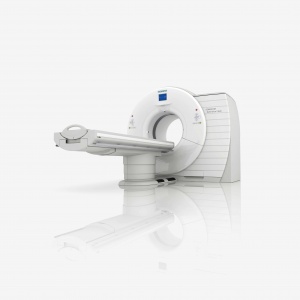August 15th, 2011 by Medgadget in News
No Comments »

GE Healthcare has received the FDA OK for its Optima CT660 computed tomography (CT) system. The CT660, which is already available in Europe, Latin America and Asia, distinguishes itself by its compact footprint combined with a modular design and low dose imaging. In addition, it is also one of the most energy efficient CT scanners available and has an “environmental design” that eases refurbishment and end-of-life recycling. The scanner itself is scalable from 32 to 128 slices through purchasable options and features automatic table positioning and a color 12-inch integrated gantry display monitor. Read more »
*This blog post was originally published at Medgadget*
November 24th, 2008 by Dr. Val Jones in Audio, News
1 Comment »
I really like new technology, especially when it offers a very obvious advantage for patients. I recently heard about a new CT scanner that is so fast, it dramatically reduces radiation exposure for patients and can take crisp images of moving organs (like the heart). I asked to speak with Siemens’ VP of Sales and Marketing, Dr. André Hartung, to find out about the new Somatom Definition Flash Dual Source CT Scanner (it takes longer to say the machine’s name than to scan your entire body). Of course, I invited my Medgadget friend, Gene Ostrovsky, to join the call. I’ve included a “bonus track” for more advanced readers at the end of this blog post. Enjoy!
Listen to the podcast here:
[audio:http://blog.getbetterhealth.com/wp-content/uploads/2008/11/andrehartunglowq1.mp3]
Dr. Val: Just to set the stage for our listeners – can you explain what a CT scanner is, and how it differs from an MRI?
Hartung: Both CT scanners and MRI machines allow healthcare professionals to look inside the human body for diagnostic purposes. While CT scanners use x-rays to produce images, MRI machines use magnets. CT Scanners are very fast and widely available – almost every hospital has one.
Dr. Val: When would a doctor want to use a CT scanner instead of an MRI machine?
Hartung: CT images are especially good at detecting cancer. Also, because CT scans can be done so quickly, they are also useful diagnostic tools for stroke, heart attack, or when a patient is in critical condition – when every second counts.
Dr. Val: You said that CT scans are based on x-ray technology. How much radiation exposure does the average CT scan cause?
Read more »












